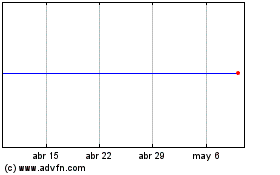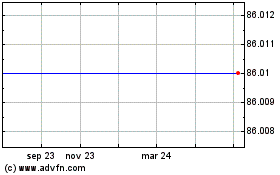By Christopher Whittall
Last month, investor Tom Ross bought bonds from Honeywell
International Inc., one of a growing number of U.S. companies
issuing debt in Europe.
Days later, Mr. Ross was at his desk when a headline made him do
a double-take. Honeywell was proposing to buy rival United
Technologies Corp, in an acquisition that the company said would
add around $36 billion of new debt to its balance sheet.
"Surely that can't be right," Mr. Ross, a fund manager at
Henderson Global Investors, remembers telling colleagues.
But it was, and within 24 hours he had sold his bonds amid
widespread investor anger that Honeywell had not disclosed an event
that would impact the value of this recently issued debt.
Honeywell abandoned the takeover in early March, but the
repercussions continue.
Fund managers here now ask whether European investors will
become more cautious over the increasing number of U.S. companies
taking advantage of the region's ultralow borrowing rates. Or will
investors soon get over their Honeywell gripe and continue buying?
The answer will say a lot about what investors are willing to put
up with as they search for returns amid rock-bottom interest
rates.
Either way, investors say the issue has highlighted a legal gray
area over how much information companies are obliged to disclose
before selling debt securities.
"It was disappointing" said Mr. Ross. "Until that news was
public, they should have held off printing the (bond) deal."
Mr. Ross said Honeywell had given no indication that they were
looking at a significant acquisition when he spoke to company
officials at their roadshow ahead of the issue. Investors said they
couldn't think of a precedent in European bond markets.
Honeywell declined to comment for this article.
Corporate bond markets are used mainly by professional investors
and so not generally subject to the same regulatory requirements as
those securities that are also sold to retail investors, such as
initial public offerings. But companies selling debt typically
publish lengthy prospectuses to provide investors with material
information that could affect the value of their securities. These
prospectuses are legal documents.
"Typically it's things you don't say that hurt investors, rather
than things you do say." said Apostolos Gkoutzinis, head of the
European capital markets group at Shearman Sterling LLP.
Mr. Gkoutzinis said whether to disclose a potential merger can
be a difficult judgment call and depends on the probability of
completion, but he advises clients to err on the side of
caution.
Honeywell, which makes everything from aviation equipment to
thermometers, said in filings with the Securities and Exchange
Commission it was raising EUR4 billion in bonds for general
corporate purposes.
This debut euro debt sale proved popular. Banks handling the
sale on Feb. 16-- Bank of America Corp., Barclays PLC, Citigroup
Inc. and Goldman Sachs Group Inc--received EUR11.25 billion ($12.4
billion) of orders, according to a person familiar with the
deal.
On the day that the deal settled, Feb. 22, reports surfaced that
Honeywell had been in merger talks with United Technologies since
last year. This was later confirmed by the companies.
The news caused the bonds to sell off, widening the differential
between yields on one part of the deal and safe government debt by
around 0.35 percentage point, according to one investor. Standard
& Poor's Ratings Services said the addition of $36 billion in
debt to Honeywell's balance sheet could cause its assessment of the
company's financial risk profile to deteriorate.
Mr. Ross said he called to berate bankers for a perceived lack
of due diligence. He said he was told that they were equally
surprised by the news.
Honeywell told investors that the company had taken legal advice
on the issue of disclosure and been told it had done nothing wrong,
said one investor.
On March 1, Honeywell called off its pursuit of United
Technologies, saying the company was unwilling to engage in
negotiations.
Honeywell's euro-denominated bonds bounced back. But investors
haven't.
"This is not how I would like to be treated as a bondholder. We
have to rely on what companies are telling us," said Wolfgang Kuhn,
a portfolio manager at Aberdeen Asset Management, who didn't buy
the Honeywell bonds.
The European Central Bank's vast stimulus program has lowered
borrowing costs in euros, tempting U.S. companies who are also
eager to widen their investor bases.
U.S. companies from Coca-Cola Co. to Apple Inc. borrowed in
euros last year, selling a record EUR66 billion in euro-denominated
debt, according to data provider Dealogic. So far this year, U.S.
companies have accounted for over a third of total bond issuance in
euros.
But some European investors say they will now be more cautious
on new U.S. deals.
But other investors believe that Europe's rock-bottom interest
rates will continue to attract U.S. companies, while yield-starved
local investors will continue to buy them.
Honeywell, for one, hasn't given up on Europe.
At a March 2 investor conference, chief financial officer Tom
Szlosek said the February sale had helped connect Honeywell with
new lenders.
"It's a market that we think we can potentially go to again in
the future," he said.
--Ted Mann contributed to this article.
Write to Christopher Whittall at
christopher.whittall@wsj.com
(END) Dow Jones Newswires
March 08, 2016 11:38 ET (16:38 GMT)
Copyright (c) 2016 Dow Jones & Company, Inc.
United Technologies (NYSE:UTX)
Gráfica de Acción Histórica
De Jun 2024 a Jul 2024

United Technologies (NYSE:UTX)
Gráfica de Acción Histórica
De Jul 2023 a Jul 2024
